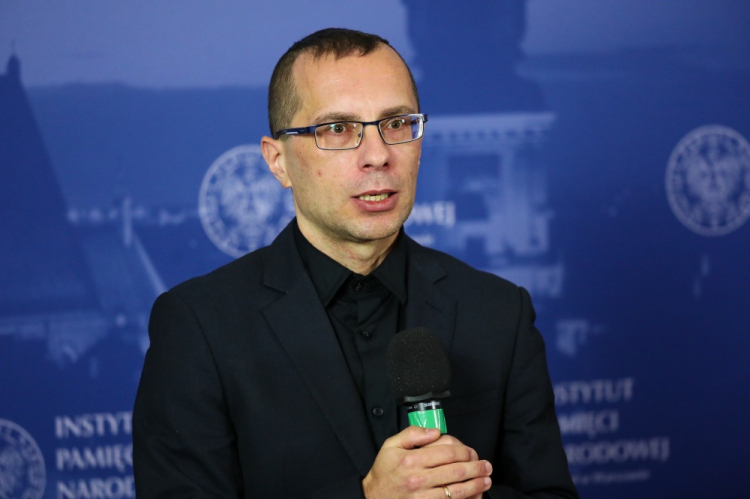 Dr hab. Patryk Pleskot. Fot. PAP/T. Gzell
Dr hab. Patryk Pleskot. Fot. PAP/T. Gzell
 Dr hab. P. Pleskot: Grzegorz Przemyk stał się symbolem bestialstwa aparatu władzy PRL
Dr hab. P. Pleskot: Grzegorz Przemyk stał się symbolem bestialstwa aparatu władzy PRL
Anna Kruszyńska
 .
.
.
Grzegorz Przemyk. Źródło: MHP
.
40 lat temu, 14 maja 1983 r., zmarł Grzegorz Przemyk, maturzysta dwa dni wcześniej skatowany w komisariacie MO przy Jezuickiej na warszawskiej Starówce. Bezpośrednią odpowiedzialność za jego śmierć ponosi grupa milicjantów. Bezkarność zapewniła im junta stanu wojennego, która bezwzględnie rozegrała tę tragedię.
.
Grzegorz Przemyk stał się symbolem bestialstwa aparatu władzy PRL. Jego sprawa jest jednak wyrzutem sumienia III RP, ponieważ nie udało się jej do końca wyjaśnić i sprawiedliwie skazać wszystkich sprawców – mówi PAP dr hab. Patryk Pleskot, naczelnik Oddziałowego Biura Badań Historycznych IPN w Warszawie.
Polska Agencja Prasowa: Czy można powiedzieć, że na Grzegorza Przemyka patrzymy w dużej mierze przez pryzmat pewnej legendy?
Dr hab. Patryk Pleskot: To zależy od tego, co rozumiemy pod określeniem „legenda”. To, że Grzegorz Przemyk został zakatowany na komisariacie MO przy ul. Jezuickiej przez zomowców, jest przecież faktem. Faktem jest także to, że w jego pogrzebie uczestniczyły tysiące ludzi, którzy w niemym pochodzie wznosili ręce w geście Solidarności. To, że o tej sprawie mówiono w całej Polsce i że władze rozpoczęły kampanię dezinformacyjną – zupełnie zresztą nieudaną, zakończoną groteskowym procesem sanitariuszy – to także są fakty.
Jeśli do legendy możemy zaliczyć nagłośnienie i znajomość tej sprawy, to tak – na Przemyka patrzymy przez legendę. Jego sprawa została bardzo nagłośniona i to wbrew pierwotnej woli władz komunistycznych. Dobrze się jednak stało, ponieważ dzięki temu poznaliśmy kolejny akt bestialstwa ze strony aparatu represji PRL.
Legenda może się również wiązać z mitem wokół danej sprawy. W przypadku morderstwa Przemyka mamy do czynienia z pewną mitologią, którą można dostrzec w interpretacji wydarzeń z 12 maja 1983 r., mówiącej o tym, że było to morderstwo zaplanowane, zlecone z góry.
PAP: A nie było?
Dr hab. P. Pleskot: Uważam, że mimo wszystko nie było, ponieważ do pewnego stopnia było to morderstwo przypadkowe. To, że Przemyk po maturze został zakatowany w komisariacie na śmierć, było efektem ślepego bestialstwa i okrucieństwa zomowców, którzy tam wtedy przebywali. To nie była przygotowana z góry akcja, która miałaby jakiś głębszy motyw.
Nie zmienia to jednak tego, że wciąż mamy do czynienia z morderstwem. I było ono morderstwem politycznym – chociażby dlatego, że od razu zostało upolitycznione. No i dotyczyło przecież chłopaka, który był kontestatorem ówczesnego systemu.
PAP: Także matka Przemyka, czyli poetka i działaczka opozycyjna Barbara Sadowska, nie była dla komunistycznych władz osobą anonimową…
Jest przy tym możliwe, że właśnie owa przypadkowość połączona z bezmyślnym okrucieństwem morderców tak poruszyła społeczeństwo. Pokazywało to bowiem, że każdy mógł się stać ofiarą systemu.
Dr hab. P. Pleskot: Zresztą w przestrzeni publicznej pojawiały się głosy, że morderstwo z premedytacją jej syna było wcześniej zamówione i miało właśnie uderzyć przede wszystkim w Sadowską.
Jednak prawdopodobnie bijący Przemyka zomowcy nie zdawali sobie sprawy, że zatrzymują, biją i mordują syna poetki, która działała w opozycji. Myślę, że takie założenie byłoby nadinterpretacją, choć całkowicie takiej możliwości nie można wykluczyć.
Jest przy tym możliwe, że właśnie owa przypadkowość połączona z bezmyślnym okrucieństwem morderców tak poruszyła społeczeństwo. Pokazywało to bowiem, że każdy mógł się stać ofiarą systemu.
PAP: Dlaczego zatem, skoro nie było to zamierzone działanie funkcjonariuszy, władze uruchomiły swoją machinę propagandową?
Dr hab. P. Pleskot: Sprawa zakatowania Przemyka była o tyle wyjątkowa, że był naoczny świadek tej sytuacji, czyli kolega Przemyka, który wraz z nim został wówczas zatrzymany. Widział, co stało się w tym komisariacie, i to nagłośnił. Był za to zresztą później represjonowany. Co więcej – Przemyk nie zmarł od razu. Trafił na pogotowie, został odesłany, potem trafił do szpitala, gdzie przeszedł operację. Również i tam lekarze zobaczyli, w jakim stanie był chłopak. Sprawy nie udało się przemilczeć.
Ponadto Barbara Sadowska wraz z synem należeli do środowiska warszawskiej opozycji. Poetka od razu nagłośniła tę sprawę. Musimy też pamiętać, że Liceum im. Andrzeja Frycza-Modrzewskiego, do którego Przemyk uczęszczał, było specyficzne, ponieważ prowadzono w nim liczne działania opozycyjne. Przemyk stał się zatem pewnego rodzaju symbolem, a dzięki temu jego sprawa mogła przejść do ówczesnej opinii publicznej.
PAP: Przemyk był także ofiarą stanu wojennego…
W dobie stanu wojennego przeciętny Polak odczuwał istnienie dużej przepaści między nim a systemem, co wcześniej nie zawsze się zdarzało. Wobec tego każdy przypadek, który by potwierdzał to, że władza jest represyjna, okrutna i bestialska, trafiał na podatny grunt społeczny i siłą rzeczy takie sprawy miały naturalną przestrzeń do nagłaśniania.
Dr hab. P. Pleskot: Mamy inne przykłady mordów politycznych z tego okresu, a każdy taki przypadek był nagłaśniany głównie przez środowiska niezależne, zwłaszcza jeśli mówimy o młodym człowieku. Tak było chociażby w sprawach Emila Barchańskiego czy Piotra Majchrzaka z 1982 r. Później była sprawa ks. Jerzego Popiełuszki, choć to było już klasyczne morderstwo polityczne z premedytacją.
W dobie stanu wojennego przeciętny Polak odczuwał istnienie dużej przepaści między nim a systemem, co wcześniej nie zawsze się zdarzało. Wobec tego każdy przypadek, który by potwierdzał to, że władza jest represyjna, okrutna i bestialska, trafiał na podatny grunt społeczny i siłą rzeczy takie sprawy miały naturalną przestrzeń do nagłaśniania.
Mimo wszystko sprawa Przemyka była wyjątkowa. Popatrzmy na absurdalne i bezczelne działania MSW, z czasem też prokuratury, a także machiny propagandowej uosabianej przez rzecznika rządu Jerzego Urbana, który po prostu kłamał w żywe oczy i oskarżał niewinnych ludzi o tę zbrodnię. Władze – przeciwnie do zamierzonego celu – same to wszystko jeszcze bardziej nakręcały.
PAP: Czy wiemy, co tak naprawdę wydarzyło się 12 maja 1983 r. w komisariacie przy ul. Jezuickiej?
Dr hab. P. Pleskot: Można powiedzieć, że znamy personalia zomowców, którzy bili Przemyka, nie do końca mamy jednak rozpoznany skład personalny milicjantów i zomowców, którzy uczestniczyli w całej tej scenie. Zatem sam proces decyzyjny dotyczący bicia nie jest jeszcze do końca jasny, wciąż są didaskalia, których nie potrafimy odtworzyć.
W poznaniu tych szczegółów nie pomaga fakt, że wpierw postępowanie karne było gmatwane i mataczone, a po 1989 r. przez tyle lat procesy sprawców pobicia Przemyka były odraczane, rewidowane. Przypomnijmy, że jeszcze w latach osiemdziesiątych zostali skazani dwaj sanitariusze oraz lekarka, która Przemyka nawet nie widziała na oczy.
Właściwie można powiedzieć, że sprawcy pobicia Przemyka i ich bezpośredni przełożeni przeszli przez tę całą sprawę suchą nogą. Jest to zatem pewien wyrzut sumienia III Rzeczypospolitej, że nie mogliśmy – nawet sporo wiedząc – dać sprawiedliwości zadość i skazać w sposób adekwatny do czynu sprawców tej zbrodni.
PAP: Czy kiedyś może jeszcze nastąpić przełom odnośnie do tego, co wydarzyło się w komisariacie?
Dr hab. P. Pleskot: Tego bym się nie spodziewał, zwłaszcza że stosunkowo dużo już wiemy. Jednak bardzo użyteczne byłoby, aby wyklarowały się szczegóły tego zdarzenia, abyśmy sekunda po sekundzie poznali to, co się wówczas stało. Obawiam się jednak, że na to jest już za późno.
PAP: Jak postać Grzegorza Przemyka rezonuje w powszechnej świadomości?
Dr hab. P. Pleskot: Mamy świetne publikacje naukowe oraz popularne, na czele z nagrodzonym reportażem historycznym Cezarego Łazarewicza „Żeby nie było śladów”. Powstał także film pod tym samym tytułem w reżyserii Jana P. Matuszyńskiego. Sprawa Przemyka zaistniała zatem w kulturze, świecie mediów. Wydaje mi się zatem, że Polacy mniej lub więcej orientują się, kim był, choć pewnie tak ogólne twierdzenie trzeba by dopiero potwierdzić sondażami.
Był to w końcu młody człowiek z rozwianymi włosami, grający na gitarze i piszący wiersze. To może właśnie wpływać na pewną jego legendę. Młodemu człowiekowi dzisiaj łatwiej utożsamić się właśnie z Przemykiem niż z także zamordowanym przez aparat represji robotnikiem. Przemyk jest bardziej bliski współczesnym ludziom.
Zawartość publikowanych artykułów i materiałów nie reprezentuje poglądów ani opinii Reunion’68,
ani też webmastera Blogu Reunion’68, chyba ze jest to wyraźnie zaznaczone.
Twoje uwagi, linki, własne artykuły lub wiadomości prześlij na adres:
webmaster@reunion68.com




